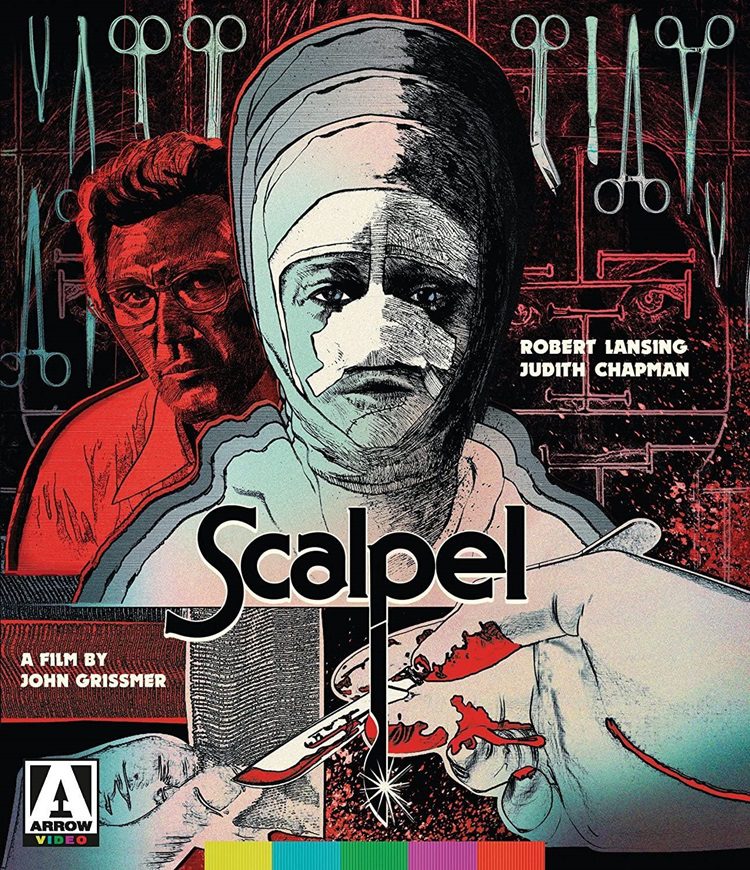
If the Southern regional horror film movement of the ’70s ever came anywhere close to making a giallo, there’s a darn good chance 1977’s Scalpel would be it. That said, the surgical roots of this delightfully twisted psychological thriller from John Grissmer ‒ the very same screenwriter/director who would later (ahem) “grace” us with the cult, late ’80s slasher guilty pleasure Blood Rage ‒ go much deeper.
Taking its cue from Georges Franju’s face game-changing 1960 masterpiece Les yeux sans visage ‒ better known to English-speaking audiences (and certain Billy Idol fans) as Eyes Without a Face ‒ Scalpel‘s “Southern Gothic” tale is an excellently crafted unsettling one. Here, former television regular Robert Lansing plays a seemingly brilliant (but utterly deranged) plastic surgeon who, following the demise of his spiteful old father-in-law, learns his daughter stands to inherit a bloody fortune. Alas, his daughter Heather (Judith Chapman), has mysteriously disappeared. The fact daddy dearest murdered her lover one night might just have had something to do with it.
Fortunately for the demented doctor, Fate sends an accident victim ‒ an anonymous stripper who gets her kisser caved in against a brick wall by a very angry bar man ‒ his way. Ignoring something called “protocol,” the surgeon instead decides to give his Jane Doe (also played by Ms. Chapman) the face of the woman he has an unhealthy fixation for, training his apt pupil to behave like Heather so they may split the inheritance. They even grow very close in the process ‒ to the point where the title of “daddy” takes on an entirely different meaning. Then, just as things almost start to seem somewhat normal for the South, the real Heather mysteriously shows up out of the blue to join them.
Laced with jaw-dropping twists and a pay-off (no pun intended) that would feel right at home in a European thriller of the same era, Scalpel is a stalwart example of a subgenre that has all but fallen off the face of film. The enthralling production offers up some surprisingly effective performances, such as Judith Chapman’s superb dual roles. Likewise, the late Mr. Lansing gives what could very well be his finest big-screen roles. The fact that three of the next four theatrical films he would appear in included nature-gone-awry disasters Empire of the Ants (1977), Island Claws (1980), and The Nest (1988) may help to substantiate my claim just a tad.
Also appearing here, in what is undoubtedly Grissmer’s best work (another easy claim for me to make here, seeing as how Blood Rage was the only other film he ever directed) are the talents of Arlen Dean Snyder as Heather’s slightly suspicious uncle, Sandy Martin (Napoleon Dynamite), and brief hicksploitation regular Bruce Atkins. Dark Shadows composer Bob Cobert (who also penned the theme for The $25,000 Pyramid!) wrote the score. Edward Lachman (The Lords of Flatbush, The Virgin Suicides) provides the cinematography, which plays a significant role in this Arrow Video release.
Presented in its intended 1.85:1 aspect ratio with two different color schemes ‒ one being on-par with Lachman’s original Southern Gothic vision (replete with warmer filters); the other sporting more traditional hues ‒ Scalpel has never looked better than it does here (not that you ever bothered renting it when it was on VHS way back when, as it was the sort of title which rarely left the shelf due to a widely-shared inability to properly classify the film!). The beautiful transfer (as culled from an internegative print scanned in 2K, as the original camera negative was nowhere to be found) sports an LPCM Mono soundtrack with optional English (SDH) subtitles.
Special features for this marvelous little gem ripe for re-discovery include an introduction to the film by John Grissmer himself, along with new (individual) interviews with Grissmer, Judith Chapman, and Edward Lachman. An image gallery, audio commentary with historian Richard Harland Smith, and a theatrical trailer (which feels like a re-titled version of a trailer re-edited for the exploitation movie market) are also included. The Arrow Video Blu-ray gives us reversible sleeve art (obverse cover art design by Twins of Evil), as well as a collectible booklet featuring a new essay by Bill Ackerman, and a reprinted examination (initially seen in Fangoria) by David Konow.
All in all, there’s a great deal to take in with Scalpel. Teetering somewhere in-between the horror, thriller, and drama genres, the film has gone largely ignored for far too long. Fortunately, Arrow Video has wisely added this strange little curiosity to their library of rare and unusual titles, and this cutting-edge effort is more than likely to get under your skin.
Needless to say, it comes Highly Recommended from yours truly.